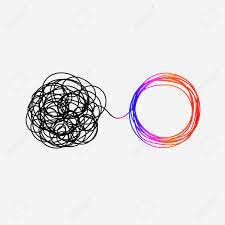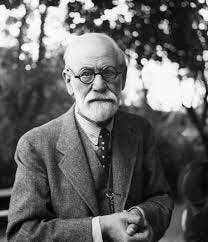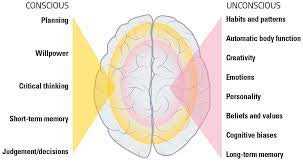Why is psychotherapy helpful for mental health concerns?
There are many answers to this question depending on how you define psychotherapy. Cognitive Behavioral Therapy, for example, is a psychotherapy that teaches a thought-pattern paradigm incompatible with maladaptive, automatic thinking. Maladaptive automatic thoughts contribute to depressed mood and anxious affect. Maladaptive thinking arises from high repetition of patterned thoughts (“I can never do this.”) until a person starts engaging in the pattern without awareness.
This is how automaticity works. You never forget how to ride a bike. In fact, persons with selective amnesia who can’t remember what a bike is called can still ride a bike without difficulty. If I put you on a bike, you will ride it, almost without thinking. In this example, automaticity initially involves conscious thoughts (start pedaling - you have to think about pedaling at first), internal autonomic brain actions (balance), emotions (I can do this). After some practice, the conscious thought (I’ve got to pedal) fades away and this behavior starts happening without awareness. I don’t recommend training wheels because when you use these the brain turns off the autonomic process (balance) and then it takes practice and repetition to turn this process back on once the training wheels are removed.
With regard to mental health, when placed under stress, you could initiate a pattern of conscious thinking that is self-defeating and that will make your stress worse - even if the stressor, realistically, stays the same. After a period of time, you start repeating, in your head, the automatic thought without conscious awareness that you are even doing it. To stop automatic self-defeating thoughts is what CBT is all about. CBT brings the automatic thought back into conscious awareness and then attempts to reframe the thought and then encourage the person to practice the reframe. If successful, CBT will facilitate, say, persistence, in the presence of, say, a slip or a mistake. Anxiety can stem from spiraling out-of-control automatic thoughts around anticipated catastrophic themes which can then disempower the individual. Steve feels like a failure at work. Each time he makes a mistake or receives corrective feedback from a supervisor, instead of acknowledging the error and trying to learn from it (adaptive thinking and then moving on), Steve automatically assumes that he'll never be able to do his work well, that he is (and always will be) an abject failure (globalization). Steve repeats this pattern over and over until eventually he can’t stop saying it to himself. When this happens, Steve starts wondering if he can ever go back to his job.
Let’s say you want to start an exercise program, you make a plan, you start, but you miss a day. This missed day could generate within you a hopeless state of mind, “I’ll never follow through with exercise or anything for that matter, so why try.” You tell yourself, “I can never follow through with this or with anything.” You feel and you are stuck.
Cognitive Behavioral Therapy (CBT) is a psychotherapy based on the idea that emotions are influenced by thoughts which then influence behavior. CBT is content heavy; that is, there is a specific content that the client learns, a curriculum, a pedagogy, sometimes an instructor (therapist) sometimes not, and outcomes, usually measurable. CBT lends itself to self-help books because it is content rich and it doesn’t require a therapist to administer it although a therapist can be helpful.
CBT doesn’t make assumptions about the phenomenology of the individual; who the individual is, what is the individual aware of, and what influences a person that is both in and out of a person’s awareness.
Returning to Freud.
What is it about Freud that keeps us coming back to his ideas? What is it Freud described that is so enduring? Why is Freud, and his ideas, or features of the human being that Freud articulated, given such credence in psychotherapy, even in the 21st Century?
Freud found aspects of human functioning that, before Freud, people didn’t really think about or were even aware of. The basis of Freud’s comprehensive theory is “the unconscious.”
Did Freud discover or create the unconscious?
Unconscious Discovered
We can’t see microbes, but we we knew they existed before we could see them and name them. We can’t see the Universe for what it is, but we know it’s there and we keep discovering new things about it.
Take, for example, the above picture from NASA’s Webb Space Telescope (JWST) launched on December 25, 2021. It was released on Wednesday (July 6, 2022), and represents 32 hours of observing time from JWST's Fine Guidance Sensor. What is the Universe? Who knows for sure? But, we do know, for sure, that it exists. Why? Because we can see it. And, we are seeing it better and better. This is called, “progress.”
To discover the unconscious is to believe that there are features of ourselves that exist beyond our own awareness. These features existed before Freud described them. In fact, we might have been aware of these features, even studied them, but these features were not recognized as an “unconscious” per se. until Freud put the pen to paper and described the unconscious.
Take, “The Freudian Slip,” What is this? = A misspeak, an unintentional verbal error. Example: “A child accidentally calls his teacher, “Mom.” This could be an honest mistake, an easy error for a child to make given the time a child spends with a teacher. However, it could also reveal subconscious feelings of the child or, in other words, secret thoughts and feelings that an individual person holds (that the individual is not aware of - “my teacher is my mother”). I once treated an older African American female client. This is when I was a psychologist in St. Louis, MO. During the course of therapy, the client addressed me as “Dr. King.” I asked her, “Why did you call me Dr. King?” She said, “Oh, you look like Dr. King, some facial resemblances I guess, because I knew Dr. King well, when he was alive.” As far as I could judge at the time, I looked nothing like Dr. King, especially since I was about 30 years old and I was White. This woman was in her late 60’s. Was this a misspeak or was it a Freudian Slip.
Are Freudian slips features of the unconscious? It’s hard to say. Sometimes they might be, sometimes they might not be. You can’t really verify a Freudian slip. The “Freudian Slip” as best as I can reason was present long before Freud labelled it as such. Is it a manifestation of the unconscious? I will leave this to you to decide.
A picture of the unconscious. What would it look like?
No one actually knows what the unconscious looks like because it is not a phenomenon that lends itself to visual inspection. It is an indirect phenomenon. Here are some questions:
Is the unconscious exclusively the domain of the individual?
Is the unconscious a product of culture or is it only influenced by culture?
Is the unconscious a conduit to a large store of feelings, states, or perceptions that occasionally the human being taps into?
Is the unconscious part of a larger eternal plan or destiny?
Do animals possess an unconscious?
The Unconscious Created
There is no such thing as an unconscious, and since it is an indirect phenomenon, it cannot be measured, photographed, or weighed or verified by any reliable assessment I know of. For all intents and purposes it doesn’t exist. We know the universe exists. We can see it. Freud wrote about an unconscious and he named it, so-to-speak, but this could just be semantics on his part. There are certainly aspects of Freud’s psychoanalytic theory that haven’t held up over time, but then again, the same is true for the theory of relativity.
What is the Unconscious?
Either way, the unconscious is an idea that caught on, and there are paradigms of reasoning, theories some might say, that are built on an unconscious within each of us. But, this doesn’t mean that a phenomenon called The Unconscious exists. One feature that seems to interact with the unconscious is “culture.” Is the unconscious simply another name for culture?
Human beings frequently operate without conscious thought. Driving a car, experiencing a happy emotion, making implicit judgements about all kinds of things. Maybe this is what the unconscious is? If this is the case, it might be argued that the unconscious is an implicit “hardwired” aspect of our brain. The brain can store memories and even complex learning routines. When we learn and practice a task (say, riding a bike) the fine motor coordination, balance, and continual adjustments while riding a two-wheeled bike become a part of our neural framework which means these memories are hardwired. They also operate without conscious consideration. We are a bundle of habits, propensities, and routines. Think about how much of your life is driven by thoughtless, but essential routines.
Is this hardwiring of the brain the unconscious?
Freud articulates several ideas. 1) Consciousness is not the unconscious although the two frequently run in parallel. The existence of a conscious state, a mode, for example, of directed thinking is, in Freud’s view, a distinctly human phenomenon. To the extent we can experience a flow of consciousness argues for a second state which we do not have direct access to, but provides a steady flow of latent material that guides conscious awareness. See the quote below (Freud’s own words):
“The assumption of an unconscious is, moreover, a perfectly legitimate one, inasmuch as in postulating it we are not departing a single step from our customary and generally accepted mode of thinking. Consciousness makes each of us aware only of his own states of mind; that other people, too, possess a consciousness is an inference which we draw by analogy from their observable utterances and actions, in order to make this behavior of theirs intelligible to us…that without any special reflection we attribute to everyone else our own constitution and therefore our consciousness… This inference (or this identification) was formerly extended by the ego to other human beings, to animals, plants, inanimate objects and to the world at large, and proved serviceable so long as their similarity to the individual ego was overwhelmingly great; but it became more untrustworthy in proportion as the difference between the ego and these ‘others’ widened…our critical judgement is already in doubt on the question of consciousness in animals; we refuse to admit it in plants and we regard the assumption of its existence in inanimate matter as mysticism (alchemy)….
It was Freud’s view that the unconscious is defined as a reservoir of feelings, thoughts, urges, and memories outside conscious awareness. Whether this is an integrated part of brain structures is unknown. Reductionistic science wants to explain the unconscious (if it exists) by breaking it down to its individual parts. This is not likely the pathway to explaining the unconscious. But, What is the explanatory pathway?
Transference is evidence that an unconscious exists.
What is Transference?
Transference is the observable manifestation of this latent reservoir of feelings, thoughts, urges, and memories.
A dictionary definition of transference is: The redirection to a substitute, usually a therapist, of emotions that were originally felt in childhood...
Transference in Therapy
Psychodynamic psychotherapy is in large part, the therapist and client recognizing the transference relationship and exploring its meaning. Since transference between client and therapist happens as an unconscious (unaware) process, psychodynamic therapists like myself use the transference relationship to identify unresolved client conflicts with, say, early childhood figures (such as the mother or the father).
In his book, The Psychology of the Transference, Carl Jung states: …within the transference dyad both participants typically experience opposites, that in love and in psychological growth, the key to [therapy] success is the ability to endure the tension of the opposites without abandoning the process...
A related psychoanalytic term is. Projection.
Projection is: The mental process whereby people attribute to others what is in their own minds. Freud categorized Projection as a defense mechanism. Defense Mechanism = A mental process (e.g., repression or projection) initiated, typically unconsciously, to avoid conscious conflict or anxiety. In Freud’s theoretical model, transference and projection are nearly the same. A minor distinction might be that transference is the process by which projection occurs.
Jung’s point of view is slightly different and more culturally-bound. Projection is (in Jung’s own words): “…the expulsion of a subjective content into an object; it is the opposite of introjection (introjection=the unconscious adoption of the ideas or attitudes of others, “boys don’t cry.”.). Projection… is a process of dissimilation, in which a subjective content becomes alienated from the subject and is, so to speak, embodied in the object. The subject gets rid of painful, incompatible contents by projecting them.” In other words, pushing painful content away from self and putting it on something (or someone) else.
Brief Case Study: Ellen
I saw Ellen some years ago. She was a 37 year old, married, White, female who was 4-months pregnant. She came to me because she felt trapped. She said that she was being abused (which by her description was being emotionally manipulated) by her spouse, Jake, to do the things that only Jake wanted to do. For example, Jake wanted to move from Rhode Island to Utah so he could pursue an outdoor adventure career. Once Ellen and Jake made the move, whatever it was that Jake had going or whatever reason he had for coming to Utah turned bad (or in her words, “fell through”) and now they were living somewhere they didn’t want to live and now with something they didn’t want to own (a house). She more than frequently brought up this concern with Jake, but he wouldn’t listen to her. He would placate her with a knowing smile, pat her on the head, then try and convince her that her views were not correct. This was Ellen’s presentation of Jake.
As I noted, Ellen was pregnant, so she felt things had to change because it wasn’t just her life Jake was ruining, but now the life of their unborn child. Her stated concern to me (her therapist) was “How do I communicate with a person like this?” Ellen was also feeling depressed, living away from her New England Family, she wanted to go home, but her husband wanted to keep pursuing a career that he felt could only be pursued in Utah. Before she was pregnant, she had entertained the idea of killing herself because she knew, deep inside, that she would never be allowed by her family to divorce Jake, and she could never influence Jake, so she was essentially trapped for life in Jake’s world and could figure no way out. Now, that she was pregnant, and everything had changed. Killing herself was out of the question. She (and her unborn child) had to: 1. Endure or 2. Escape.
Ellen was raised in a New England Family, at least that is how she described her family: “Traditional New Englanders.” Father was head of the home, men got all the attention and the credit. A woman’s place was in the home. Although she excelled in school, no one in her family cared (this was her report). Everyone was counting on her younger brother, Bill, to succeed in life. He was the “golden child.” According to Ellen, her brother Bill was basically worthless and cared for no one but himself. As a child, Bill would tease her. Her parents would never stand up for her or see her point of view. Bill was always right, Bill could do no wrong.
Early on, she promised herself one thing. She would never marry someone like her father. AND, She would certainly never marry someone like her brother, Bill. She actually didn’t want to marry at all. She wanted to pursue a career in medicine.
But, guess what! Marrying a “Bill” surrogate was exactly what happened. Jake was just like her brother, Bill. Predictably, Jake was also a beloved in-law. Jake could do no wrong. She could never speak against Jake in her parents’ presence.
The only issue that created conflict with her parents was Jake’s insistence on moving to Utah to pursue an outdoor adventure career. Even though her parents did not want to see them move away, they went along with Jake and his hair-brained idea. “After all,” said Ellen, “Jake could do no wrong.” Her mother told her, “Ellen, dear, the most important thing is for you to support your husband.”
All this infuriated Ellen, but, she never said a word, never spoke against her mother. This was unthinkable. This would have been breaking the traditional family code. No disruption, no disagreements, no divorce, happy couple, happy children, happy family.
As Ellen continued her story, I started feeling guilty. The way she spoke to me, it almost seemed as if Ellen had already determined that I was probably going to take Jake’s point of view. Time and again, Ellen would throw into her story that she figured I was thinking that she was an over-entitled spouse. After all, she’d say, Jake was bringing home a good salary, they were considering buying a home in Utah, he found time in his busy week to do things with her, etc., etc. But then she’d jump back into, “But, he doesn’t really listen to me. He degrades who I am without actually saying it.” I eventually learned that it was Jake who suggested that Ellen see a counselor because Ellen kept telling Jake that she was unhappy.
For a number of reasons, this was a challenging case from the get-go. Ellen certainly pushed several of my own vulnerability buttons, but at the same time, I was intrigued with how, as the therapist, I took on multiple caricatures of persons in her life. For a while, I was her father, then I shifted and I became her husband, Jake. I was, for a time, her brother, Bill. And, there were even times that she became romantically attracted to me (during the phase, I think, that I became her husband, Jake). There were two Jakes in Ellen’s unconscious world: 1) The charming, attractive, strong, handsome Jake. Then there was 2) The overbearing, authoritarian, selfish, removed and remote Jake.
I saw Ellen for quite a period of time and would occasionally check in with her to see who she thought “I” was. Unfortunately, Ellen lacked much insight into her own unconscious state. She was, for the most part a utilitarian minded person. For example, even though she said that she had the grades and the test scores in school to pursue medical school (she was a pre-med student at a well-respected undergraduate liberal arts college), she eventually decided to pursue a degree in nursing, and this decision, she reported, was because her parents indicated that Ellen, although intellectually able enough, might not have the emotional temperament to be a physician. She eventually agreed with them and she subsequently sailed through her undergraduate nursing education. She was at the time I saw her, a registered nurse.
Ellen wanted help from me. She wanted affirmation that she was oppressed in a male-dominated culture. She wanted validation, but when I gave her validation she pushed me away or discounted it. I would say:
Therapist: It must have been difficult growing up in a home where you felt undervalued.
Ellen: Yes, but you can never understand how I felt. After all, you are a man. Men can’t appreciate what it is like to be completely disregarded by the people closest to them.
Interpretation
Here, Ellen directly criticizes me (or an aspect of me) that - like her- I can do nothing about. Being male. In this instance, being male is a flaw I cannot work around “After all, you are a man…” This is at the core of her issue, “After all, Dr., I (Ellen) am a woman…” “I can’t do anything about my sex…” Then, she underscores what is not possible for “a man” - “Men (Jake, my Father, you, my Brother Bill) can’t appreciate…” Sure, I’m a Doctor (but also a man) and because I am a man, no matter how much learning I have (as a doctor), I will not be able to appreciate her predicament. So, I (the Doctor) like her husband, Jake, can’t appreciate (or is unable to appreciate) her predicament. Therefore, I am unavailable to help her.
What is her predicament? To be understood without bias, to be completely appreciated for her female viewpoint. This is the predicament that she feels so powerless to do anything about. What is a woman to do in a man’s world where the bias in perceiving and thinking is in favor of the impermeable masculine point of view? Is her only option to give in to the wishes of a man and ignore her own needs?
In a way, through this process of transference, Ellen is sharing with me at a deep level - wanting me to feel and to understand - her femaleness which (like my maleness) she is unable to change. This predicament would be for any woman in Ellen’s situation. Yes, Ellen is criticizing me (and my maleness), but she is also sharing with me the impossibility of her situation (I conjecture this conflict is expressed from her unconscious self). It, in a nutshell, is her core existential dilemma. It is through transference that Ellen expresses to me this deeply-felt issue and the emotion that goes along with it.
….
Therapist: Can you describe how you felt when Jake told you that moving to Utah was the only way he could succeed in his career?
Ellen: I didn’t know what to feel. I was afraid that if I tried to suggest ways to work around it that Jake would think I wasn’t supporting him. So, I just agreed with him.
Therapist: How about asking Jake to clarify - maybe to help you understand - why he thought moving to Utah was the only way he could succeed in his career.
Ellen: This wouldn’t work. His mind was already made up when he told me.
Therapist: What makes you think his mind was made up when he first told you about it? Did he tell you that his mind was made up?
Ellen: The way he said it. Do you think I would be in counseling if I could influence how Jake thinks? You don’t seem to understand what it’s like to be in a relationship where you have no say about things.
………….
Think, for a moment, what it must have been like to be Ellen, to live in Ellen’s world. How must Ellen feel? It is clear that Ellen feels victimized by an overpowering cultural socialization force where women are seen as subservient to men especially when it comes to one’s career path. What must it feel like to live in a world where you have a strong identity of yourself as a female, but you are being treated like a second-class citizen because of your sex. This is a feature of yourself that you cannot change. What do you do with these feelings? How do you reconcile mixed feelings about your personal choices in such a world? For example, Should I be a doctor or a nurse? At one point, Ellen concludes the only option is self-annihilation because she simply can’t live under this identity shaping tyranny. She struggles internally, feeling responsible for her own choices, she knows suicide is a bad choice, but her choices are limited by her constricted world. She can’t rebel, this is forbidden, taboo, worse than suicide (in her mind). She can’t even embrace her world because she doesn’t feel that she can make an independent choice. Now, she is pregnant. She is responsible for an infant who will need her, at first, 100% of the time. Is she planning on perpetuating this worldview by teaching her child the same things she learned growing up? If she doesn’t, she will be turning her back on the world she lives in.
This is a ripe context for transference. Why? Because Ellen is experiencing what I call a “core conflict.” A Core Conflict is a disparity between what you feel you want and need and what you feel is being pressed or pushed on you by an outside force. In this case, Ellen needs to be validated for who she is and what she wants. She needs to feel heard and understood by someone. On the other hand, everyone in her life chooses not to see her for who she is and listen to her from a point of view where Ellen feels valued. She has no say in her current world.
Ellen is angry. Very angry. But, there is no outlet for that anger. Therapy can provide the semblance of an outlet, but the therapist must be ready to take on roles and personifications of the source of her anger, in this case it is her husband Jake; her brother, Bill; her father and her mother; even the world where she grew up, her teachers and other adults in her childhood promoting the “New Englander” cultural norms.
She started to explore this with me. How did she do this? She would project a persona onto me (her Brother, Bill) and then she would begin to interact with me as if I was that person (transference).
There were many, many times early on when Ellen was not aware that she was using me as an object of transference. She would look at me. I would see anger in her eyes, sometimes frustration, sometimes fear. She wasn’t looking at me. She was looking at someone else. She was interacting with someone else. But, she was struggling with this experience. She saw me as the therapist, but it was like I would be instantaneously transformed. Anything I did, anything I said, she viewed as suspicious, and she would catch me in all kinds of mixed messages. She said once, “I’m not even sure why I’m seeing you, you are a man, you can never understand what I am telling you.”
Eventually, Ellen became so angry with me that she terminated our sessions. One might ask, If Ellen terminated the sessions an unhappy client, how can this be a success?
It’s hard to know the answer to this question, but my sense is that Ellen had during our relatively brief interchange, a chance to explore her internal conflicts. To the best of my knowledge, Ellen never did voice her core concerns to Jake as she voiced them to me. She did have give birth to a child, a boy, and (I guess?) this young family moved back to New England. I never heard from her again. Her capacity for insight was limited, but her sense of conflict strong. Ellen needed a way to offload her anger in a context where she felt there would be no long-term consequences. She chose me and she chose therapy for this purpose, and the process that she employed was projection and transference. She didn’t “learn” this process as you would learn a psychotherapy technique like CBT. The transference process was already in her. But, she needed an object. The therapist, in this case, became that object. The process of transference is unconscious, our of conscious awareness and manipulation. She was honestly angry with her therapist, but then again, I was not her therapist. I can only surmise that I was a representation of “all the men in her life that she felt abused her.” This is how transference works and this is why it can be so confusing to an outside observer of the process.
Continuing Blog Entry, July 16, 2022
.









